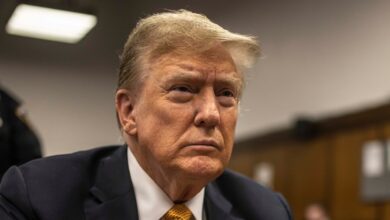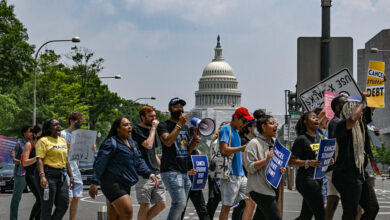TikTok Sues US Government Over Potential Ban

Less than two weeks after President Biden signed a bill that will force TikTok’s Chinese owner, ByteDance, to sell the popular social media app or face a ban in the United States, TikTok said it sued the federal government on Tuesday, arguing the law was unconstitutional.
TikTok said that the law violated the First Amendment by effectively removing an app that millions of Americans use to share their views and communicate freely. It also argued that a divestiture was “simply not possible,” especially within the law’s 270-day timeline, pointing to difficulties such as Beijing’s refusal to sell a key feature that powers TikTok in the United States.
“For the first time in history, Congress has enacted a law that subjects a single, named speech platform to a permanent, nationwide ban, and bars every American from participating in a unique online community with more than one billion people worldwide,” the company said in the 67-page petition it provided, which initiates the lawsuit. “There is no question: The act will force a shutdown of TikTok by Jan. 19, 2025.”
TikTok is battling for its survival in the United States, with the fight set to play out primarily in courts over the next few months. While lawmakers who passed the bill have said the app is a national security threat because of its ties to China, the courts must now weigh those concerns against TikTok’s argument that a sale or ban would violate the First Amendment free-speech rights of its users and hurt small businesses that owe their livelihood to the platform.
Several legal experts expect the case to land in front of the Supreme Court.
Under the new law, which was signed on April 24, TikTok has nine months, or a year if the president gives it an extension, to find a non-Chinese buyer. If it doesn’t, the law requires U.S. app stores and web hosting services to stop working with it — essentially a ban.
TikTok filed the suit in the U.S. Court of Appeals for the District of Columbia Circuit a day after its chief executive, Shou Chew, appeared with his wife at the Met Gala, where he was an honorary chair.
At the heart of the case will be lawmakers’ intent to defend the United States from what they and some security experts say is a national security threat because the Chinese government could lean on ByteDance to turn over sensitive TikTok user data or use the app to spread propaganda. Legal experts have said the mandate to sell or block the app could result in changes to TikTok’s content policies and shape what users are able to freely share on the platform, potentially violating their free speech rights.
TikTok argued in its suit that selling its U.S. operations was not “commercially, technologically, or legally feasible.” A part of that argument hinges on how TikTok and its competitors are global in nature and content is accessible across country borders, with international videos as part of its appeal.
It is also impossible to move the app’s underlying coding to a new owner, TikTok argued, adding that it would take years for a new set of engineers to familiarize themselves with that code to develop and maintain the platform. The engineers would also need access to ByteDance software to keep TikTok functioning, which the new law prohibits, the company argued.
TikTok’s success also hinges on its recommendation algorithm, which helps surface tailored content to users, something the Chinese government has said it would not sell, the suit notes.
TikTok pointed to the billions of dollars it has spent to address potential security risks in the past four years and a draft 90-page national security agreement that made “extraordinary” commitments to the U.S. government. The company said that it even agreed to give the government a “shutdown option” that would allow it to suspend TikTok in the United States if the company violated parts of its agreement.
National security concerns about TikTok are “speculative” and fall short of what’s required to justify violating First Amendment rights, the company argued in its suit, adding that President Biden and other members of Congress’s use of the platform undermines claims that it’s a threat.
TikTok asked the court to issue a declaratory judgment saying that the law violates the Constitution and to issue an order that would stop Attorney General Merrick B. Garland from enforcing it.
A spokesman for the Department of Justice declined to comment on potential litigation.
The government is likely to defend the law by saying it is calling for a sale, not a ban. The government will probably also need to make a strong case that its national security concerns justify the limitation on speech if TikTok is banned.
The Justice Department, which was involved in drafting the law, weighed in on language that would help the Biden administration best defend it in court.
“They’re going to have to support their concerns with evidence in a way that they haven’t really done, at least in the court of public opinion, and they’re going to have to show that their concerns can’t be addressed in narrower ways,” Ramya Krishnan, a senior lawyer at the Knight First Amendment Institute at Columbia University, said in an interview before the petition was filed.
The institute expects to support a challenge to the law, she said. The American Civil Liberties Union has also said it opposes the law and may help with litigation.
Fears of a potential security threat from TikTok have escalated in the last year and a half, prompting bans of the app on federal devices and those issued by some city and state governments. Still, the app has continued to grow in popularity, shaping culture and becoming a source of news for younger Americans as well as a place where an expanding cohort of content creators make their living.
TikTok’s efforts to address national security concerns have also included separating its U.S. user data from the rest of the company’s operations and providing third-party oversight of its content recommendations.
TikTok has had success in challenging similar state and federal actions though this law differs in its broad support from Congress and the Biden administration.
Last year, Montana passed a law that would have barred TikTok from operating in the state as of Jan. 1, saying the company presented a security threat to its citizens. A group of TikTok users filed a lawsuit funded by the app, saying the law violated their First Amendment rights and outstripped the state’s legal authority. TikTok also filed a separate lawsuit within a week, arguing that the legislation violated the First Amendment.
In November, a federal judge blocked the Montana ban, saying it most likely violated the First Amendment and a clause that gives Congress the power to regulate commerce with foreign nations.
Former President Donald J. Trump also tried to ban or force the sale of TikTok in 2020 with an executive order citing similar security concerns. Federal courts blocked the Commerce Department from carrying out his plan in part on First Amendment grounds, with one judge adding it would shut down a “platform for expressive activity.” Another judge said the government most likely overstepped its legal authority and “acted in an arbitrary and capricious manner by failing to consider obvious alternatives.”



